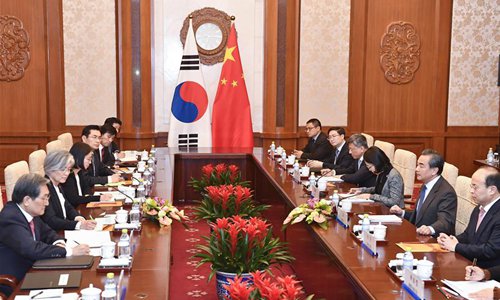China urges S.Korea to honor pledge about THAAD

Chinese Foreign Minister Wang Yi holds talks with Kang Kyung-wha, foreign minister of the Republic of Korea, in Beijing on Wednesday. Photo: Xinhua
China has urged South Korea to uphold its pledge not to allow the US Terminal High Altitude Area Defense (THAAD) system to harm China's security interests as South Korean Foreign Minister Kang Kyung-wha concluded her three-day visit to China on Thursday.
Analysts warned that if South Korea reneges on its pledge, it would plunge bilateral ties to a much lower level, causing irreversible damage to mutual trust.
Kang's visit to China was seen as preparation for South Korean PresidentMoon Jae-in's state visit to Beijing in December.
Chinese Foreign Minister Wang Yi said during his meeting on Wednesday with Kang that China values South Korea's three-point pledge that it will not add to the existing THAAD system, not participate in the US-led missile defense system, and not participate in the proposed Japan-South Korea-US military alliance, as well as its vow not to harm China's security interests.
He called for joint efforts from the two sides to further increase mutual understanding, minimize their differences and create conditions for the full recovery of bilateral ties.
"The THAAD problem is not over. Both countries have agreed to temporarily put aside differences for the sake of the bigger picture of bilateral relations," Zheng Jiyong, director of Fudan University's Center for Korean Studies, told the Global Times on Thursday.
The two countries announced a deal to mend ties in October.
"However, the nature of the THAAD issue has not changed. China hopes South Korea can properly handle the issue and stick to its promises. We are very concerned that if the pledge is broken, the impact on bilateral ties may well exceed any of the previous shockwaves. South Korea must recognize the gravity of this problem and discreetly deal with THAAD," Zheng said.
Analysts said reaffirming Seoul's three-point pledge on THAAD would also be on Moon's agenda during his Beijing visit. Other core issues include theKorean Peninsulanuclear crisis and how to repair trade and other economic ties.
Tensions on peninsula
The two foreign ministers also discussed the Korean Peninsula nuclear issue.
Wang said China and South Korea share a common interest in solving the issue through talks and safeguarding peace and stability on the peninsula, calling on the two sides to enhance strategic communication.
Kang said South Korea shares the view that all parties should do their part to solve the issue through talks and consultations, and that pressure and sanctions are not the solution.
On Monday, US President Donald Trump relistedNorth Koreaas a terrorism-sponsoring state, along with Iran, Sudan and Syria.
In response, a spokesperson from North Korea's Korea Asia-Pacific Peace Committee said Wednesday the relisting is a "hideous political provocation" and threatened a countermeasure that "will be up to the US' action," according to the Pyongyang-based Korean Central News Agency.
Analysts said the US move has dimmed hopes for diplomacy by sending the wrong signal to Pyongyang after its two-month hiatus in weapons tests.
"There have been signs of restraint from North Korea in the past two months and the tensions were just beginning to subside. Trump's decision is uncalled for and provokes trouble from nothing. This means uncertainty on the Korean Peninsula will significantly grow," Lü Chao, a researcher at the Liaoning Academy of Social Sciences, told the Global Times on Thursday.
"The situation on the Korean Peninsula has reached a very critical and sensitive stage. China and South Korea share a great consensus on maintaining stability and preventing war from breaking out. Strengthening communication in the face of rising uncertainty is another very important aspect of Moon's visit," Zheng said.
Your Comment
Name E-mailRelated News
-
;
Based in Lhasa, Tibet Vista is a Tibet travel agency that specialized in Tibet permit, and Tibet tours for both private and group travelers at a local price!
•4 Days Lhasa City Group Tour from USD 460 •8 Days Everest Base Camp Group Tour from USD 850 •15 Days Mt.Kailash Group Tour from USD 1780 •2016 Tibet Train Tours from Beijing, Shanghai, Chengdu, Xining,etc










